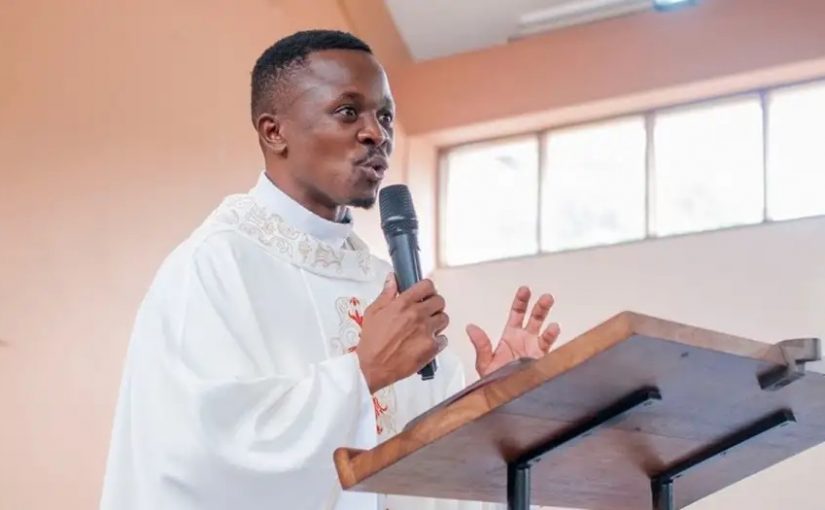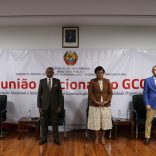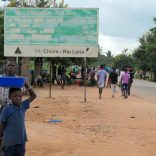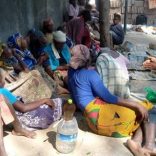Mozambique: Attorney-General calls for “strategic response” to organized crime
Mozambique: Attempts to silence a Catholic priest? – DW

FILE - Frei Lafim Maria: Critical, awareness-raising homilies have led to threats of persecution [Image via DW Africa]
- Frei Lafim Maria, known for his critical and inspiring homilies, faces death threats and political persecution. A Mozambican activist says that “there are attempts to silence him”, and that a transfer is being planned.
Criticism of electoral fraud in the 2023 Mozambican local elections earned him political persecution. We are talking about Frei Lafim Maria. As a result of his distinctive and awareness-raising homilies, he is now receiving death threats, and is reportedly persecuted by the secret service and even by members of the Catholic Church itself. On social media, he receives a wave of support, mainly from young people who repeat his religious motto ‘God Knows, God Cares’ [Deus Sabe, Deus Cuida].
In an interview with DW, Catholic social activist David Fardo denounces alleged attempts to silence this uncomfortable voice by transferring him to Brazil, as happened with Bishop of Pemba Luiz Fernando Lisboa, who denounced irregularities in the context of the insurgency in northern Mozambique.
Daniel Fardo describes Friar Lafim Maria as an inspirational figure, especially for young people, and highlights the importance of the friar’s homilies, which address not only spiritual issues, but also social and political issues, encouraging young people to fight for truth and justice.
DW Africa: Who is Friar Lafim Maria?
David Fardo (DF): He is known as a priest of the Catholic Church. He is a young, dynamic and proactive friar, especially concerned with social causes, who, in addition to [in] the Catholic Church, also raises awareness among young people about good practices, about young people loving the truth, about young people and society as a whole […]. At the same time, his homilies, which have also done this work, we, as young people, let’s say, also feel increasingly inspired by.
DW Africa: Friar Lafim Maria spoke out against fraud during the local elections. Was this what earned him the political persecution he faces today?
DF: Well, we want to believe so, because we know that in Mozambique, generally, when we talk about political issues, especially issues related to the current government, we are often seen as enemies of the government itself. But, besides the fact that Friar Lafim raised issues related to the 2023 local elections during his homilies, he is the friar who touches most on issues related to raising awareness among the youth and society’s participation in the country’s development. In recent times, we have seen an attempt by the state itself to intrude into the religious life of the different sects or religions that are established here in Mozambique.

DW Africa: Didn’t even this intrusion and the threats from SISE stop Frei Lafim from praying?
DF: At no point did his prayers stop, and we see Frei Lafim as a mirror of strength, robustness, and firmness in what we believe in. Because even during the various homilies and vigils that Brother Lafim organised with the youth, he never stopped encouraging the youth to be persevering and strong, just as he has his motto, which is “God knows, God cares.”
When we talk about this government intrusion into religious life, we have had several situations, one of them recently, the transfer of the bishop of Pemba [Luiz Fernando Lisboa] when he was speaking about the situations in Cabo Delgado, the insurgency, and overnight, he was transferred to Brazil.
It is also because of this threat that Brother Lafim is currently suffering an attempt to keep him religiously silent, in addition to the fact that he has also received death threats, and intelligence [agents] has been placed behind him and is monitoring his homilies. Now we have information about a possible transfer to Brazil. So we have seen that priests who tend to open the conscience of the youth and society, are ultimately seen as enemies by the government of the day.
DW Africa: And does this political persecution begin within the Catholic Church itself?
DF: On this subject, it may be difficult to say yes or no, but on the one hand the Church may even be under threat from the Government of the day, in a contemporary situation, in the sense that Friar Lafim had approaches that are outside of religion, outside of the Church, and that it is a need for the Church itself to control or find solutions for itself. So, I want to say that this persecution, this intimidation, is not the primary fruit within the Church itself, but rather a consequence of the system of government of the day.













Leave a Reply
Be the First to Comment!
You must be logged in to post a comment.
You must be logged in to post a comment.